“When I was an Intern:” Faculty Reflections
In the last edition of On the Same Page, I discussed the evolving environment of residency training against the historical backdrop of an earlier era in which “house staff” or “hospital residents” referred to physicians who resided in the hospital.
Much has changed. But despite the evolution in work hours and educational philosophy, there is a common thread that runs through generations of house staff: residency training is the most physically and emotionally demanding time in the lengthy process of becoming a physician, and yet it is a time when the lessons learned are the most exhilarating and the most deeply etched.
To capture this experience, I asked several physician faculty in Gainesville and Jacksonville to tell a story about “when I was an intern.” Even though these stories are told from different perspectives — different eras of training, different specialties, and a different focus — I think you will see the common thread.
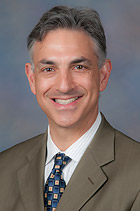 Mark Bleiweis, M.D.
The William G. Lassiter, Jr. and Aneice R. Lassiter Professorship
Associate Professor, Surgery and Pediatrics
Director and Principal Cardiothoracic Surgeon
UF Health Congenital Heart Center
Mark Bleiweis, M.D.
The William G. Lassiter, Jr. and Aneice R. Lassiter Professorship
Associate Professor, Surgery and Pediatrics
Director and Principal Cardiothoracic Surgeon
UF Health Congenital Heart Center
When I was an intern…I had an excellent and diverse group of surgical mentors that impacted the way I take care of patients today. Rod White, a vascular surgeon, was an early leader in the field of aortic stent grafting and created an environment that encouraged critical thinking and surgical innovation. His calm demeanor and easy-going personality lured many young faculty, residents, and students to work with him on the clinical services and in the lab. I often think of Rod’s courage to explore controversial new techniques and devices as we currently delve into cutting edge technologies, like the Berlin Heart or the Syncardia Total Artificial Heart.
Stan Klein, a general surgeon in the truest sense, did everything—and did it all so well! He was the trauma doc, the oncologic surgeon, the vascular surgeon, the critical care guru, and the best surgical educator I have ever known. It was his dedication to patient care and the sacrifices he made to teach us how to take care of patients that impacted me most. It was commonplace to be in the surgical intensive care unit (SICU) at 2 AM when Stan would come bursting in through the doors to check on a sick trauma patient, wondering “how the oxygen delivery was.” There are too numerous to count cases when Stan would be called to bail us (faculty and resident) out of a particularly bad situation—day or night. Klein rounds on Saturday were at least four hours and always generated a clipboard full of new tests to make sure we didn’t miss any possible diagnosis on the differential. In those days of no work hour limitations—and I mean absolutely no work hour limitation!—this was a grueling experience for any intern. He was equally gifted in the operating room, although he was notorious for large incisions counter to the growing interest in minimally invasive techniques. He often chided us for the length of the incision, “pinhead incisions for pinhead surgeons…give him back the knife!” Dr. Klein ran the Morbidity and Mortality Conference, and we all dreaded standing next to him at the podium presenting the “list” or being called upon to answer a barrage of questions. From Stan, I learned to love surgery for all its clinical aspects—the excitement to make a diagnosis, the thrill of a great technical operation, the privilege to make someone feel better no matter what the personal sacrifice.
Internship is taxing—physically, emotionally, and socially. As difficult as it was, I look back at a year filled with enormous learning experiences with great colleagues and faculty—experiences that very early on led me on course to become an academic cardiac surgeon.
 Richard A. Davidson, M.D., M.P.H.
Associate Vice President for Health Affairs- Interprofessional Education
Distinguished Teaching Professor
Professor of Medicine, Epidemiology and Health Policy
Richard A. Davidson, M.D., M.P.H.
Associate Vice President for Health Affairs- Interprofessional Education
Distinguished Teaching Professor
Professor of Medicine, Epidemiology and Health Policy
I trained at Vanderbilt in internal medicine, at the time an every-other-night training program. My very first rotation as an intern was in the ER, my second was on the “private service,” which had no resident at night and most of the attendings were private. My first night on call I was called to see a 26 year old woman whose twin sister was a nurse on the floor. She was being treated for a staph infected patent ductus arteriosis that had never closed and had gotten several weeks of antibiotics. That night the infection tracked into the esophagus and ruptured the ductus, resulting in massive hematemesis, the kind I’ve never seen since. I got there, with no resident or attending and called surgery, started some lines, and ordered blood. Every time we would get her blood pressure up she would again have massive hematemesis and become unresponsive. A surgical resident and intern came and we pushed her onto the elevator to the OR; I was convinced I would never see her again. The next morning she was up and walking around the SICU. It was a brutal introduction to the ward services, but taught me that with help, I was capable of contributing in significant ways to patient’s lives. That’s an important lesson for every new intern.
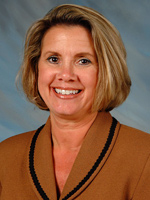 Linda R. Edwards, M.D.
Chief, Division of General Internal Medicine
Associate Chair, Department of Medicine and Associate Professor
Co-Medical Director, Jacksonville Health and Transition Services
Linda R. Edwards, M.D.
Chief, Division of General Internal Medicine
Associate Chair, Department of Medicine and Associate Professor
Co-Medical Director, Jacksonville Health and Transition Services
As an intern, in late 1981, I was involved in the care of a young African American man who presented with bilateral pneumonia that was not responsive to the usual treatment and routine cultures were unrevealing. We eventually identified Pneumocystis carinii (now called Pneumocystis jirovecii) as the culprit. I had inquired about whether he used IV drugs because we saw a significant number of IV drug users at Duval Medical Center. He denied any use of IV drugs. What I did not ask him was whether he was gay—asking sexual preference was not always part of the social history that we obtained at that time. Since this was an infection seen in those that are immune compromised and this was, to our knowledge, an otherwise healthy young man, we were perplexed. As was the case in many patients with PCP at that time, he did not survive. In all likelihood, this was the first patient with AIDS that was treated at Duval Medical Center. In 1981 the first cases of AIDS were identified in gay men in San Francisco and in the fall of 1982, the term, acquired immunodeficiency syndrome was coined. Much has been learned since the early ‘80’s and now HIV is a chronic disease and AIDS defining illnesses are less frequent because of the treatment modalities (HAART) that are available to manage these patients. HIV and AIDS remain a major public health issue. In addition to the therapies available, our best treatment and prevention is education to stop the spread of the virus as well as continued efforts in vaccine development.
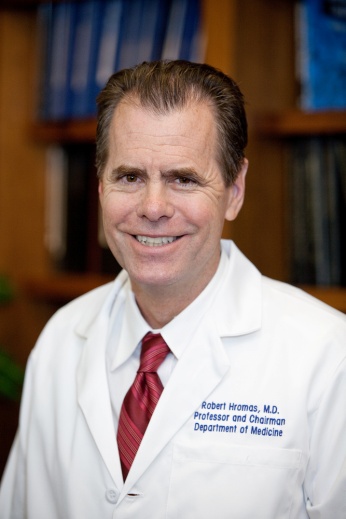 Robert A. Hromas, M.D., F.A.C.P.
Chairman, Department of Medicine
Professor of Medicine
Robert A. Hromas, M.D., F.A.C.P.
Chairman, Department of Medicine
Professor of Medicine
First night as an intern, my shoulders tight, in the CICU, squeaking wheels running down the hall towards me, a new admission? The doors crash open, bed rolls into an open bay, senior resident trails behind shuffling papers, “Left ventricular MI, BP going down, he needs a Swan.” What? A Swan? I have never put one in…”I’ll show you, it’s easy.”
We set up, scrub, glove, “First find the subclavian vein,” he says. I poke, suction, and draw air, patient’s art line shows his pressure dropping, “Great, you idiot, you gave him a pneumo!” He turns to the nurse, “Get the chest tube kit.” To me, “Now you’ll learn to put in a chest tube.” I sat by his bed all night, scared, swearing this would never happen again. I begged every central line, every art line, from every resident everywhere, not peds though, hey, kids have tiny vessels. I took extra MICU call, worked in a local ER, and did lines, swearing each time, never, never air again.
My last general medicine rotation of residency, leading my team across the University of Iowa lobby, crossing our path an elderly man has sudden death, hits the tile floor like a stone. We jump, startled, I say “Wow, what a place for V. Fib, Ok, start chest compression,” to one of the interns, “Get a crash cart,” to the other. Crash cart comes, I grab a 15 guage and a wire, Betadine his neck, and while he is bouncing on the floor with chest compressions, stick an IJ, first time, and push epi. Shock. Glance at the rhythm strip…a Rhythm? Yes! Ha, what a place to have sudden death, yeah, Ok, let’s get him to the CICU.
None of us is perfect, we all make mistakes, we all have weaknesses, and we are all afraid of them. Line after line, I was scared, even the man on the floor, still afraid of failure. Whether we succeed or not as physicians is whether we can turn weakness into strength. What is my weakness now? Can I face it?
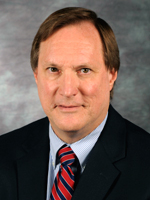 Mark L. Hudak, M.D.
Chair, Department of Pediatrics
Chief, Division of Neonatology
Associate Medical Director NICU Wolfson Children's Hospital
Assistant Dean of Managed Care
UF Health at Jacksonville
Mark L. Hudak, M.D.
Chair, Department of Pediatrics
Chief, Division of Neonatology
Associate Medical Director NICU Wolfson Children's Hospital
Assistant Dean of Managed Care
UF Health at Jacksonville
My first year as a pediatric resident on the Harriet Lane service at the Johns Hopkins Hospital endures as a kaleidoscope of indelible memories. Even after more than three decades, these vivid recollections maintain my focus to strive for the best possible patient care, reinforce my humility, and elicit a sense of deep gratitude for the privilege of service. Some of my best memories attest how the crucible of internship transformed many of my bright but naïve fellow interns into superb compassionate professionals. I can share but a few of the many vignettes that weave a vivid panoply of remembrances and emotions. Bonding: commencing at the June 30 Crab Feast, where our intern class learned how to extract crab meat using wooden hammers ... Ignorance: placing a peritoneal dialysis catheter in Baby Boy Willy P in my first month as an intern in the neonatal intensive care unit (NICU) at the Baltimore City Hospital, following directions from a book per the suggestion of my absent attending, while my supervisory resident was out on a neonatal transport … Enlightenment and thankfulness: five months later, watching a fellow intern place the same catheter in another baby at the Hopkins NICU under the supervision of two attendings—but with catastrophic results … Confusion: running with my senior resident from the 5th floor NICU to the 2nd floor labor and delivery (L&D) suite for a complicated delivery and not knowing whether to resuscitate the infant or my resident (who had collapsed on the floor wheezing) first … Sorrow: attending the funeral and a family reception for Lisa D, a young girl with aplastic anemia and one of my first eight non-neonatal patients after she succumbed to systemic candidiasis … Terror: reintubating Baby Girl Lakeisha B (a 1200 gram baby with esophageal atresia) during surgical rounds. In a true Hopkins experiment, she underwent placement of magnetic bullets in her esophageal pouch and her distal esophagus (to “grow” her esophageal segments closer together before anastomosis). The attending surgeon hovered over my back (I suppose to ensure I did not intubate her esophagus and push the bullet through the pouch) … Happiness: taking care of Baby Girl Special L in continuity clinic, after pulling her through severe meconium aspiration pneumonia complicated by three or four chest tubes in the NICU … Humility: ensuring three weeks of antibiotics for Jamal B to treat group B strep meningitis, obtaining sterile CSF 24 hours after treatment, but racing to his code in the ED three days later as he herniated due to the same disease ... Illumination: realizing that the senior NICU nurses were among my best teachers, ever … And of course gratitude: to my fellow residents and attendings for the incredible camaraderie and teaching that helped me to survive internship but more importantly allowed me to treasure it as the best professional year of my life.
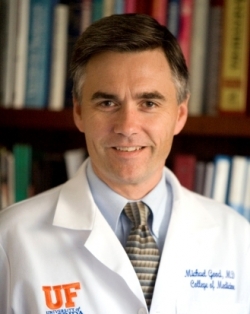 Michael L. Good, M.D.
Dean, UF College of Medicine
Michael L. Good, M.D.
Dean, UF College of Medicine
Treating the patient, not the organs: Internship for me began with several months of intra-operative anesthesiology, followed by several months of internal medicine. In those days (1984), the ward medicine teams cared for their patients in the medical intensive care unit (MICU), and also provided cross cover at night for MICU patients on other teams. During one of my first sleepless nights as an intern, my senior resident and I were responsible for a cross cover MICU patient who was suffering from severe multiple organ failure. “No one dies on our shift,” I was told. So we went to work. Already knowledgeable about potent vasopressors and inotropes from my anesthesiology experiences, I spent the entire night sequentially adding and continually increasing the powerful drips, advancing oxygen and other ventilator settings, pushing diuretics, and so on. As the morning sun rose, we momentarily felt a sense of accomplishment as we return the care of the patient, now with profoundly ischemic fingers and toes and comatose, back to the care of his primary medicine team. Later that morning, we learned the primary team and especially their attending physician was not impressed with our heroics, and after important conversations with the family, had begun undoing all that we had done during the night. The patient expired later that morning. I was exhausted from the sleepless night, and perplexed by what it had accomplished. The experience imprinted in me the important lesson that as physicians, our goal is to treat the whole patient as a human being, not a series of individual organs each to be kept alive at all costs. Over the ensuing months and years, I became comfortable knowing when to resuscitate and when to palliate, a clinical skill that I trace back to this early intern experience in the MICU.
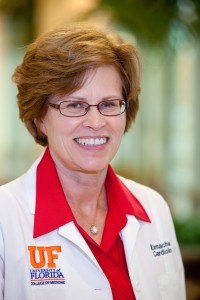 Marian Limacher, M.D., F.A.C.C., F.A.H.A., F.A.C.P.
Professor of Medicine, Division of Cardiovascular Medicine
Senior Associate Dean for Faculty Affairs and Professional Development
Marian Limacher, M.D., F.A.C.C., F.A.H.A., F.A.C.P.
Professor of Medicine, Division of Cardiovascular Medicine
Senior Associate Dean for Faculty Affairs and Professional Development
I experienced a myriad of emotions the day I started as an intern in Houston. I was proud but hesitant; resolute but insecure; and absolutely excited about embarking on the experience that would define me as a physician over the coming year. I was in a new city, a new apartment, a new culture (Texas is not just a state, but a state of mind!) and among an intern class of strangers who yet were instant comrades. Ours was the era of every 3rd night call on “regular rotations” and every other night in the ICUs. I started on the inpatient Nephrology service, with a senior resident, several students and multiple attendings. We would admit patients through the day, round with each attending, break for noon conference (pre-packaged sandwiches but with homemade pies) and complete procedures and discharges throughout the day. Normal days were at least 12 hours. There were no days off, even on weekends. On the first Sunday, I finished rounds and notes by noon and accepted an invitation to go to dinner at a friend’s parents’ home an hour north of the city. Just as we were finishing dessert, I got a page from my resident. I was wondering what he could have wanted on a Sunday night that we weren’t on call. He asked where I was. He said that the Sunday night admissions were ready to be worked up! No one had told me the service scheduled elective admissions for Sunday night so that the extensive inpatient workups could begin on Monday morning. I was devastated. Tears flowed as I explained to my hosts that I had to leave. This was my first few hours away from the hospital and now I was headed back. Those five patients kept me until after midnight and I was on call the next day. I learned then that the resident was the key to survival. Communication and setting clear expectations are crucial elements of teamwork that are most evident when lacking. I made sure I knew exactly what was expected of me for each rotation after that!
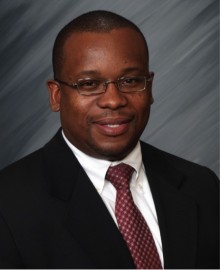 Joseph A Tyndall, M.D., M.P.H., F.A.C.E.P.
Chair, Department of Emergency Medicine and Associate Professor
Chief of Emergency Services- UF Health Shands Hospital
Joseph A Tyndall, M.D., M.P.H., F.A.C.E.P.
Chair, Department of Emergency Medicine and Associate Professor
Chief of Emergency Services- UF Health Shands Hospital
I began my year as an intern soon after my 25th birthday. I worried about two issues. At the time, I had the same soft boyish looks of the 16 year old that I was when I entered college. I therefore had some concerns about whether or not I would be taken seriously as a doctor. My second worry was about how I would be able to make true connections and a lasting impression on an individual patient. Like so many of my classmates and generations of physicians before me, a driving force for entering the field of medicine was my desire for the patient interaction. I was torn between the traditional notion of creating lifetime relationships with patients and the short limited interactions that were sure to occur in practicing Emergency Medicine. It took a patient -an elderly woman in her 8th decade of life -to change my entire perspective on ways I could contribute as an Emergency Physician. She presented to our Emergency Department grief stricken. She had lost her husband after more than 50 years of marriage and drove herself to our Emergency Department in Maryland immediately after the funeral. Her complaints were subtle -nausea, a choking sensation in her throat. When I first encountered her, she was curled up on our stretcher, fully clothed in her winter coat. She had no cardiac history from what I could remember. Her EKG was not particularly exciting. In a busy urban emergency department, I ended up spending what appeared like an eternity with her. Sitting on a chair at her bedside holding her hand, probing her with questions, listening to her recollections and jokes about her life with her husband, and listening to her advice on life that she proffered to me. She eventually called me her “Doogie Howser”. She thanked me for spending time with her and for listening. That day, I learned, not only about the subtleties of acute coronary syndrome presentations, but I also learned that I too could make an important difference – even with the briefest of interactions. I also began to understand how powerful those interactions could be. Before she was wheeled away to the coronary intensive care unit, she asked if I would become her personal doctor. It was the biggest compliment an intern in emergency medicine could ever receive. I was ready to begin my career and to learn from the thousands of patients I was sure to meet. I thanked her for all she did for me.
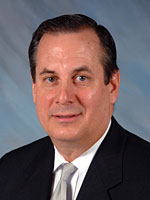 David J. Vukich, M.D., F.A.C.E.P.
Professor
Department of Emergency Medicine
Senior Associate Dean for Hospital Affairs
Senior Vice President and Chief Medical Officer/Chief Quality Officer, UF Health Jacksonville
David J. Vukich, M.D., F.A.C.E.P.
Professor
Department of Emergency Medicine
Senior Associate Dean for Hospital Affairs
Senior Vice President and Chief Medical Officer/Chief Quality Officer, UF Health Jacksonville
35 years later, that first terrifying week of internship is as real as if it was today. For the first time, nurses and pharmacists were going to do exactly what we ordered without a real doctor approving it! Back then, the residency program director assigned us to the schedule in pairs for the first month. Later we learned he did this to enhance patient safety, hoping that two brand new interns were better than one at decision making. But for the first couple days of internship the senior residents told us they paired us up because they were afraid we’d cry if we worked alone. That was closer to the truth than we wanted to believe. It was the second day, actually 32 hours into our 36 hours on call, that we met Mrs. Johnson. 72 year old female, pancreatic cancer, post-op day four, abdominal discomfort. OMG! What do we do? Give her more pain meds, order labs, replace the NG tube, get a new-fangled thing called CT scan? With eyes big and breath held, we crept into her room hoping not to wake her up. No such luck. “Are you my doctors”? Stammering I said “Yes, Ma’am.” She smiled through her pain. “Come over here boys. Hold an old woman’s hand and make me feel better. How old are you honey?” We worked our way slowly to either side of the bed and timidly held her hands. We chatted for a while, our anxiety and blood pressure falling slowly. She was a retired nurse who had “birthed” many interns in her career and our trepidation was obvious to her. As she lay there holding our hands, we realized for that moment, that she was the healer and we were the patients. As was the case with pancreatic cancer, Mrs. Johnson did not survive long. But in the first 32 hours of our careers, she had given us a lesson in humility and compassion that we will never forget. Thank you, Mrs. Johnson. Thank you.
 Christopher R. Williams, M.D.
Associate Professor of Surgery
Director, Urologic Oncology, Research, and Robotic Surgery
UF College of Medicine–Jacksonville
Christopher R. Williams, M.D.
Associate Professor of Surgery
Director, Urologic Oncology, Research, and Robotic Surgery
UF College of Medicine–Jacksonville
I vividly recall a patient encounter during the first of my two mandatory General Surgery preliminary years prior to starting my Urology residency. Our service had been asked to consult on a patient for GI bleeding. My recollection was that our plan was for scheduled upper and lower endoscopy at a later date. While cross-covering another service that evening on the same floor as the aforementioned patient, I noticed that the nursing staff continued to bring bed pans full of blood from her room. Being curious and concerned, I entered the room to inquire about her status. I found her to be hypotensive and tachycardic and the nurses stated that they had been unable to reach her doctor. Not knowing exactly what to do but knowing who would, I immediately called my chief resident to inform him. Though she was not officially our patient, my chief resident’s words still ring in my ears today: “Chris don’t you let them kill that lady! You take over!” I then sprang into action. I entered the room and advised the nurses of my intentions to take over care until they could contact the covering physician. I ordered blood transfusions and placed a central line for large bore access. In the meantime, the cross-covering intern responsible for the patient was reached. I apprised him of the situation and he stated that he was unaware due to an inadequate patient check-out. He stated that I actually knew more about the patient than he did and asked for me to continue to do whatever was necessary to care for her. The following day, we took her to surgery for a partial gastrectomy for a bleeding ulcer. Prior to leaving the hospital the following week, she thanked me for saving her life. I recently discharged a patient from the hospital after a 4month stay during which he required 9 trips to the operating room and numerous additional procedures. All but two days of his hospitalization were spent in an ICU setting, and after the first week most of his care was unrelated to Urology. However, I remained the attending of record and coordinated his care as best I could throughout his hospitalization because of how I was trained to care for patients as an intern.
 Daniel R. Wilson, M.D., Ph.D.
Senior Vice President for Academic Affairs
Professor of Neurology & Psychiatry;
Dean, UF College of Medicine–Jacksonville
Vice President for Health Affairs, University of Florida
Daniel R. Wilson, M.D., Ph.D.
Senior Vice President for Academic Affairs
Professor of Neurology & Psychiatry;
Dean, UF College of Medicine–Jacksonville
Vice President for Health Affairs, University of Florida
Internship. Whew! What a year. My newly conferred MD degree seemed insufficient, and so it was. The authentic identity as a doctor was yet to be “earned” amid a year that by turns was fascinating, exhausting, stressful, fun, and ultimately deeply gratifying. Though for me much remains a bit of a fog, there are innumerable clear memories—some richly hilarious, others profoundly affecting, and more than a few deeply disturbing. One was to do with a pleasant octogenarian who had emigrated from the Ukraine as a young man with his then-young wife.
“Mr. A” was admitted with end-stage infiltrating leukemia for which he wanted no active treatment. However his physician, also Ukrainian, agreed with (or, possibly, convinced) the wife that extremely active treatment was warranted. Sadly, this was in the days before much of end-of-life care was settled law and practice, so weeks of elaborate care were rendered at great expense to a patient who did not wish it. Indeed, every morning as I met with my patients before team rounds Mr. A would say “let me die today.” But later the attending would order more assertive tests and treatments. I grew deeply distressed, with neither the ability to convince the attending such “care” was unethical nor any authority to alter the course of treatment.
At his bedside one evening I was aghast at how he had withered away. I felt a strong urge to bolt from the hospital and even from medicine. Just then a firm hand gripped my shoulder and the Chief-of-Staff said softly “Dr. Wilson, I am so sorry about this travesty but do know it ends tomorrow.” The next day there was a formal conference that found the Mr. A was entirely competent and his stated preferences were to be followed. When I told him of this, he smiled gently and whispered “thank you.” Two nights later he died comfortably and quietly in his sleep.
The resolute dignity and grace of this gentleman in his suffering amid a knot of social, legal, moral, medical, and policy dilemmas was a lesson I, as a physician, shall cherish forever unto my own dying day (and, I hope, even beyond!). Meanwhile, I wish all our new interns the best for the year ahead and that they have patient-teachers who are, in their own ways, as good as Mr. A.
Forward Together,
David S. Guzick, M.D., Ph.D. Senior Vice President, Health Affairs President, UF Health
About the author
